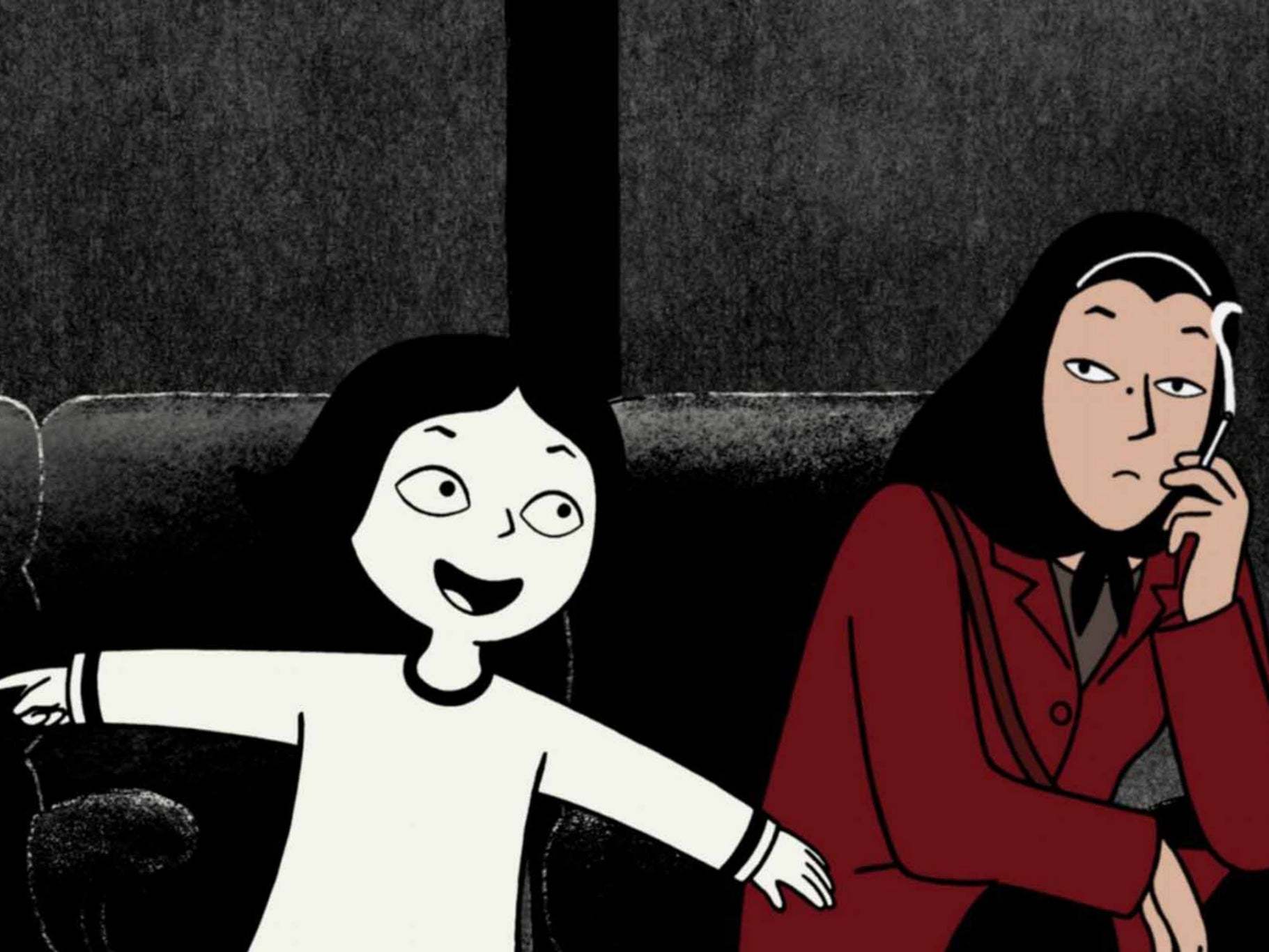Why Persepolis remains one of the century’s greatest animated films
Based on Marjane Satrapi’s experiences growing up in Iran, the film serves as a sprawling, impressionistic map of the director’s own brain, writes Clarisse Loughrey


A woman sits forlorn in an airport terminal. Her head, heavy as a pile of rocks, comes to rest on her hand, as her spine starts to crumple in response. A cigarette protrudes from her mouth. Airports are filled with these kinds of deflated figures. You always wonder what’s on their mind. Heartbreak? Dejection? Disappointment? Ennui? In this instance, the woman is Marjane (Chiara Mastroianni), the protagonist of 2007’s Persepolis, one of this century’s most inventive and provocative animated films. We’re watching her in the depths of an identity crisis.
Marjane is actually Marjane Satrapi, the film’s writer-director, who settled in France as a young woman in order to escape Iran’s oppressive regime. Persepolis serves as an adaptation of her own bestselling autobiographical graphic novel, published in two parts in 2003 and 2004. And she’s alone, at check-in, because she can’t quite summon the strength to return to her homeland. It’s still a place of pain. Suddenly, we see the colours fade. A child sprints across the screen; it’s Marjane’s younger self. From there, the film plunges into the realm of memory, dissolving into a flashback rendered in stark, expressionistic black-and-white.
As a young girl, Marjane operates in the mode of delightful gremlin: spoilt, smart, loud, inquisitive. She’s obsessed with Bruce Lee and carries delusions that she’s a heaven-sent prophet. Her parents indulge her eccentricities. They’re well-to-do socialists in the pre-revolutionary Iran of the Seventies; while the ruling Shah was a dictator who imprisoned several of Marjane’s relatives, her mother and father stayed quiet and lived in relative freedom.
That all changed in 1979, when the Iranian Revolution deposed the Shah, only for the fundamentalist Islamic Republic to take his place. Marjane’s parents had dreamt of a brighter future – what takes hold is driven purely by nationalism and religious fanaticism. War with Iraq devastates the country, while the government executes political opponents in their thousands. The women put on veils, the boozy parties move underground, and 14-year-old Marjane is sent to Vienna in fear of where her rebellious nature might lead. Her DIY jacket, decorated with the words “Punk is not ded”, is already attracting the wrong kind of attention.
Persepolis did well with critics – The Independent called it “a unique delight” – and at international festivals, winning the Jury Prize at the 2007 Cannes Film Festival. It was even nominated for the Academy Award for Best Animated Feature, losing to Pixar’s Ratatouille. But the political backlash was both expected and fierce in nature. In 2011, a Tunisian television station aired the film, shortly after Islamist party Ennahda won a majority of seats in parliament. Protesters set the station’s offices ablaze and its owner, Nabil Karoui, was ordered by the government to pay a fine of 2,4000 dinars (£1,000), on charges of “violating sacred values” and “disturbing the public order”.
And yet, Satrapi has repeatedly warned audiences off treating Persepolis as a political screed. It is, first and foremost, an intimate work of personal history and artistic expression, while carefully replicating the graphic novel’s clean lines and minimalist design. In the director’s eyes, that simplicity allows the film to function as a “universal story”, free from any attempts to exoticise its locations. It’s disheartening to hear that any director would feel such an implicit pressure to appease western audiences – the true freedom of traditional animation is not a release from cultural specificity, but from the confines of material reality.
With the aid of co-director Vincent Paronnaud and a team of 20 animators, Persepolis becomes a sprawling, impressionistic map of Satrapi’s own brain, as busy with humour and imagination as it is the traumas of war. We see Marjane conduct imaginary conversations with God and Karl Max. In a period of recovery, following a suicide attempt, we’re treated to a montage set to her own splendidly tone-deaf rendition of “Eye of the Tiger”.
Within that framework, Satrapi attempts to unpack her own conflicted sense of identity. Her escape to Austria isn’t presented as a moment of salvation – the kids her age treat her oppression as a novelty, a trendy accessory to their anarchist posturing. She tells strangers that she’s French: is it to avoid awkward questions or does it come out of an internalised guilt? Her family is still suffering and here she is, out nightly at bars and punk gigs, caught up in the “petty-bourgeois emotion” that is romantic love. When her heart is broken, there’s no shoulder to lean on.
But, when she returns to Iran, it’s love again that labels her as an outsider, after she’s arrested for publicly holding hands with a man. “I am a stranger in Austria and now I’m one in my own country,” she laments. The place she felt at home – the Iran that once was – exists now only as a memory. That is why we find her, years later, alone at the departures terminal. Persepolis offers no answers – only the feeling of being stranded between time and place.
Join our commenting forum
Join thought-provoking conversations, follow other Independent readers and see their replies
Comments
Bookmark popover
Removed from bookmarks